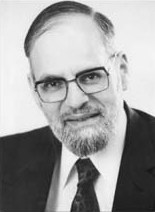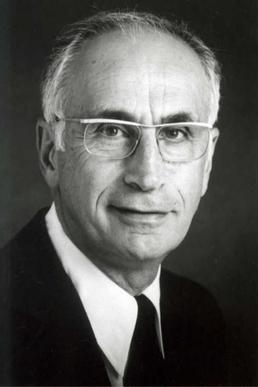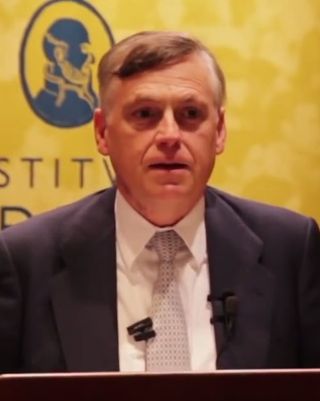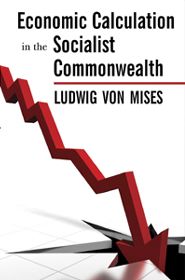
The Austrian school is a heterodox school of economic thought that advocates strict adherence to methodological individualism, the concept that social phenomena result primarily from the motivations and actions of individuals along with their self interest. Austrian-school theorists hold that economic theory should be exclusively derived from basic principles of human action.
The economic calculation problem (ECP) is a criticism of using central economic planning as a substitute for market-based allocation of the factors of production. It was first proposed by Ludwig von Mises in his 1920 article "Economic Calculation in the Socialist Commonwealth" and later expanded upon by Friedrich Hayek.

Friedrich August von Hayek, often referred to by his initials F. A. Hayek, was an Austrian-British academic who contributed to economics, political philosophy, psychology, and intellectual history. Hayek shared the 1974 Nobel Memorial Prize in Economic Sciences with Gunnar Myrdal for work on money and economic fluctuations, and the interdependence of economic, social and institutional phenomena. His account of how prices communicate information is widely regarded as an important contribution to economics that led to him receiving the prize.

Israel Meir Kirzner is a British-born American economist, historian, rabbi, and Talmudist closely identified with the Austrian School.

Ludwig Maurits Lachmann was a German economist, economic theorist and important contributor to the Austrian School of Economics. Lachmann, Israel Kirzner, and Murray Rothbard were the three primary catalysts of the Austrian 'revival', beginning in 1974. He wrote on economic theory, history, and methodology, as well as on the application of Hermeneutics to economic thought, in order to interpret economic phenomena.
The Ludwig von Mises Institute for Austrian Economics, or Mises Institute, is a nonprofit think tank headquartered in Auburn, Alabama, that is a center for Austrian economics, right-wing libertarian thought and the paleolibertarian and anarcho-capitalist movements in the United States. It is named after the economist Ludwig von Mises (1881–1973) and promotes the Misesian version of heterodox Austrian economics.

The Road to Serfdom is a book by the Austrian-British economist and philosopher Friedrich Hayek. In the book, Hayek "[warns] of the danger of tyranny that inevitably results from government control of economic decision-making through central planning." He further argues that the abandonment of individualism and classical liberalism inevitably leads to a loss of freedom, the creation of an oppressive society, the tyranny of a dictator, and the serfdom of the individual. Hayek challenged the view, popular among British Marxists, that fascism was a capitalist reaction against socialism. He argued that fascism, Nazism, and state-socialism had common roots in central economic planning and empowering the state over the individual.
Spontaneous order, also named self-organization in the hard sciences, is the spontaneous emergence of order out of seeming chaos. The term "self-organization" is more often used for physical changes and biological processes, while "spontaneous order" is typically used to describe the emergence of various kinds of social orders in human social networks from the behavior of a combination of self-interested individuals who are not intentionally trying to create order through planning. Proposed examples of systems which evolved through spontaneous order or self-organization include the evolution of life on Earth, language, crystal structure, the Internet, Wikipedia, and free market economy.

Armen Albert Alchian was an American economist who made major contributions to microeconomic theory and the theory of the firm. He spent almost his entire career at the University of California, Los Angeles (UCLA), and is credited with turning its economics department into one of the country's best. He is also known as one of the founders of new institutional economics, and widely acknowledged for his work on property rights.

Criticism of socialism is any critique of socialist economics and socialist models of organization and their feasibility, as well as the political and social implications of adopting such a system. Some critiques are not necessarily directed toward socialism as a system but rather toward the socialist movement, parties, or existing states. Some critics consider socialism to be a purely theoretical concept that should be criticized on theoretical grounds, such as in the economic calculation problem and the socialist calculation debate, while others hold that certain historical examples exist and that they can be criticized on practical grounds. Because there are many types of socialism, most critiques are focused on a specific type of socialism, that of the command economy and the experience of Soviet-type economies that may not apply to all forms of socialism as different models of socialism conflict with each other over questions of property ownership, economic coordination and how socialism is to be achieved. Critics of specific models of socialism might be advocates of a different type of socialism.
The Austrian business cycle theory (ABCT) is an economic theory developed by the Austrian School of economics seeking to explain how business cycles occur. The theory views business cycles as the consequence of excessive growth in bank credit due to artificially low interest rates set by a central bank or fractional reserve banks. The Austrian business cycle theory originated in the work of Austrian School economists Ludwig von Mises and Friedrich Hayek. Hayek won the Nobel Prize in Economics in 1974 in part for his work on this theory.

Jesús Huerta de Soto Ballester is a Spanish economist of the Austrian School. He is a professor in the Department of Applied Economics at King Juan Carlos University of Madrid, Spain and a Senior Fellow at the Mises Institute.
Peter Joseph Boettke is an American economist of the Austrian school. He is currently a professor of economics and philosophy at George Mason University; the BB&T Professor for the Study of Capitalism, vice president for research, and director of the F.A. Hayek Program for Advanced Study in Philosophy, Politics, and Economics at the Mercatus Center at George Mason University.

Ludwig Heinrich Edler von Mises was an Austrian–American economist, logician, sociologist, and philosopher of economics of the Austrian school. Mises wrote and lectured extensively on the societal contributions of classical liberalism and the power of consumers. He is best known for his work in praxeology, particularly for studies comparing communism and capitalism, as well as for being a defender of classical liberalism in the face of rising illiberalism and authoritarianism throughout much of Europe during the 20th century.

Economic Calculation in the Socialist Commonwealth is an article by Austrian School economist Ludwig von Mises. Its critique against economic calculation in a centrally planned economy triggered the decades-long economic calculation debate.
Throughout modern history, a variety of perspectives on capitalism have evolved based on different schools of thought.
Nicolai Juul Foss is a Danish organizational theorist, and scholar of entrepreneurship and strategy. He is currently a professor at the Copenhagen Business School where he has spent most of his career. Foss' main contribution to organization theory is through the micro-foundational perspective in organization theory and management—examining how individual behaviors aggregate to affect the behavior of larger groups and organizations. He was created a Knight of the Order of the Dannebrog in 2015.
Teppo Felin is the Douglas D. Anderson Professor of Strategy & Entrepreneurship at the Huntsman School of Business at Utah State University. He is also the Founding Director of the Institute for Interdisciplinary Study. From 2013 to 2021, Felin was Professor of Strategy at the Saïd Business School at the University of Oxford. His current research focuses on cognition, rationality, perception, organizational economics, markets and strategy.

The socialist calculation debate, sometimes known as the economic calculation debate, was a discourse on the subject of how a socialist economy would perform economic calculation given the absence of the law of value, money, financial prices for capital goods and private ownership of the means of production. More specifically, the debate was centered on the application of economic planning for the allocation of the means of production as a substitute for capital markets and whether or not such an arrangement would be superior to capitalism in terms of efficiency and productivity.

Saras D. Sarasvathy is an American entrepreneurship professor and recipient of the 2022 Global Award for Entrepreneurship Research. She is currently the Paul M. Hammaker Professor in Business Administration at the University of Virginia Darden School of Business and the Jamuna Raghavan Chair Professor in Entrepreneurship, Indian Institute of Management, Bangalore. She serves on the editorial boards or as associate editor of several academic journals as well as serving as an outside director to the public company LendingTree. She is best known for her conception of Effectuation, a theory of Entrepreneurial action based on the study of Expert Entrepreneurs. Her award-winning journal article - "Causation and Effectuation: Toward a Theoretical Shift from Economic Inevitability to Entrepreneurial Contingency" is one of the most highly cited academic articles about entrepreneurship of all time.











